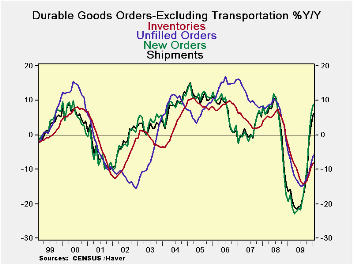 Global| Mar 24 2010
Global| Mar 24 2010Durable Goods Trends Continue Higher
Summary
Broad trends: Durable goods orders and shipments are still rebounding, but the pace of increase has topped out in February when we observe the Yr/Yr trend in the chart. The rise in orders continues to run ahead of shipments growth. [...]

Broad trends: Durable goods orders and shipments are still rebounding, but the pace of increase has topped out in February when we observe the Yr/Yr trend in the chart. The rise in orders continues to run ahead of shipments growth. That bodes well for the prospect for a further advance in shipments. Also the continuing advance of the Fed surveys for March tells us that the MFG rebound is continuing and argues to interpret current weakness as weather-related disruptions to monthly durable goods data as just the sort we’d expect after seeing the knock-down in hours in the February employment report. The monthly data are showing some weakening trends but when grouped into three-month intervals durable goods trends are holding up much better.
Monthly patterns: Monthly data show shipments are off by 0.6% and falling by 0.1% in January. New Orders rose by 0.5% in February compared to a rise of 3.9% in January. Unfilled orders now are up for two months in a row at 0.4% in February and 0.2% in January. Inventories also are up for two months running by 0.3% in February and 0.1% in January. Despite the two-month drop in shipments, many trends even on a monthly basis still show improvement.
Short-term growth rate trends and progressions - The three-month sequential growth rates show shipments are still growing and at a relatively rapid and steady pace in the most recent three months. Orders are accelerating steadily over increasingly more recent three-month periods. Inventories switch to growing from shrinking over the most recent three-month period. Unfilled orders continue to shrink, but the pace of shrinkage is decelerating.
Summing up - Excluding transportation, orders are weaker but shipments are stronger over 3 months and 12 months. For nondefense capital goods, shipments are declining over three months but orders are extremely strong. Ultimately order strength should bring shipments around as shipments are more likely than orders to succumb to short term disturbances like bad weather.
| Durable Goods Orders | |||||
|---|---|---|---|---|---|
| Durable Goods | 3Mo | 6Mo | 9Mo | 12Mo | YearAgo |
| Shipments | 7.0% | 8.8% | 8.2% | 2.1% | -17.3% |
| New Orders | 28.1% | 17.9% | 12.2% | 10.9% | -26.2% |
| Unfilled Orders | -1.1% | -3.6% | -4.5% | -6.5% | -2.3% |
| Inventories | 0.8% | -2.7% | -6.9% | -9.0% | 3.4% |
| I:S Ratio | 1.72 | 1.79 | 1.89 | 1.90 | 1.52 |
| Excluding Transportation | 3Mo | 6Mo | 9Mo | 12Mo | YearAgo |
| Shipments | 9.9% | 9.9% | 9.3% | 3.2% | -16.1% |
| New Orders | 9.2% | 12.9% | 12.3% | 7.9% | -19.9% |
| Unfilled Orders | 3.2% | 2.6% | 0.4% | -3.6% | -7.2% |
| Inventories | 0.5% | -3.1% | -8.2% | -11.0% | -0.1% |
| I:S Ratio | 1.61 | 1.67 | 1.79 | 1.82 | 1.53 |
| Excluding Defense | 3Mo | 6Mo | 9Mo | 12Mo | YearAgo |
| Shipments | 7.1% | 9.3% | 8.5% | 1.8% | -19.3% |
| New Orders | 21.9% | 18.1% | 14.9% | 11.0% | -27.7% |
| Unfilled Orders | -0.2% | -1.9% | -3.1% | -6.4% | -3.9% |
| Inventories | -0.1% | -3.6% | -7.9% | -10.2% | 3.0% |
| I:S Ratio | 1.70 | 1.78 | 1.89 | 1.89 | 1.48 |
| NonDefense Capital Goods | 3Mo | 6Mo | 9Mo | 12Mo | YearAgo |
| Shipments | -0.8% | 6.0% | 3.6% | -0.7% | -12.9% |
| New Orders | 58.5% | 33.9% | 19.1% | 21.4% | -33.4% |
| Unfilled Orders | -1.4% | -4.5% | -5.4% | -8.0% | -0.9% |
| Inventories | 0.0% | -3.6% | -7.7% | -8.7% | 10.8% |
| I:S Ratio | 2.30 | 2.42 | 2.52 | 2.51 | 1.97 |
| Memo: PPI Durables | 0.6% | -0.5% | 0.3% | 0.2% | 3.4% |
Robert Brusca
AuthorMore in Author Profile »Robert A. Brusca is Chief Economist of Fact and Opinion Economics, a consulting firm he founded in Manhattan. He has been an economist on Wall Street for over 25 years. He has visited central banking and large institutional clients in over 30 countries in his career as an economist. Mr. Brusca was a Divisional Research Chief at the Federal Reserve Bank of NY (Chief of the International Financial markets Division), a Fed Watcher at Irving Trust and Chief Economist at Nikko Securities International. He is widely quoted and appears in various media. Mr. Brusca holds an MA and Ph.D. in economics from Michigan State University and a BA in Economics from the University of Michigan. His research pursues his strong interests in non aligned policy economics as well as international economics. FAO Economics’ research targets investors to assist them in making better investment decisions in stocks, bonds and in a variety of international assets. The company does not manage money and has no conflicts in giving economic advice.






